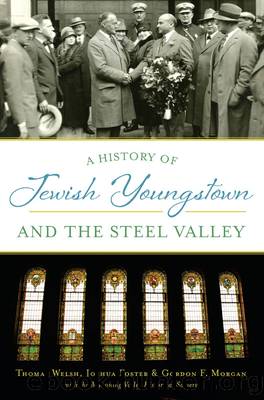A History of Jewish Youngstown and the Steel Valley by Thomas Welsh Joshua Foster Gordon F. Morgan

Author:Thomas Welsh, Joshua Foster, Gordon F. Morgan [Thomas Welsh, Joshua Foster, Gordon F. Morgan]
Language: eng
Format: epub
Tags: Social Science, Jewish Studies, Photography, Subjects & Themes, Historical, History, Jewish, United States, State & Local, Midwest (IA; IL; IN; KS; MI; MN; MO; ND; NE; OH; SD; WI)
ISBN: 9781625856418
Google: q0kwDwAAQBAJ
Publisher: Arcadia Publishing
Published: 2017-05-01T15:55:55+00:00
6
Optimism and Activism
On July 17, 1948, two months after the establishment of the State of Israel, residents of the Mahoning Valley learned of the death of Rodef Sholomâs rabbi emeritus, Isadore E. Philo, who succumbed to a heart ailment at the age of seventy-four. Known for the âringing tonesâ of his public oratory, Rabbi Philo had served for decades as the unofficial âvoiceâ of the regional Jewish community.283 For three decades, before health problems intervened, he spoke on issues ranging from the role of religion in a post-Darwinian society to the dangers of anti-Semitism. In more recent years, Rabbi Philo had lent moral authority to local efforts to address the problem of racial discrimination, prompting the Youngstown Interracial Committee, a group with ties to local African American leaders, to praise the late rabbi for his âleft-minded sense of duty to his position as a spiritual leader.â284
While the loss of Rabbi Philo was a blow to the local Jewish community, the region continued to attract exceptional leaders, a trend highlighted in January 1951, when Rabbi J. Leonard Azneer became the spiritual leader of Anshe Emeth. Rabbi Azneer, who earned a doctorate in philosophy from the Jewish Theological Seminary of America, was the former national board director of the National Synagogues of America and served on the National Advisory Committee of the United Jewish Appeal. Moreover, in February 1951, Rabbi Azneer was appointed to the national board of the United Synagogues of America, one of five rabbis in the country selected. The organization, which comprised all of the nationâs Conservative congregations, determined policies for the laity, while setting standards for the theological seminaries that trained rabbis.285
Download
This site does not store any files on its server. We only index and link to content provided by other sites. Please contact the content providers to delete copyright contents if any and email us, we'll remove relevant links or contents immediately.
| Americas | African Americans |
| Civil War | Colonial Period |
| Immigrants | Revolution & Founding |
| State & Local |
In Cold Blood by Truman Capote(3361)
The Innovators: How a Group of Hackers, Geniuses, and Geeks Created the Digital Revolution by Walter Isaacson(3093)
Steve Jobs by Walter Isaacson(2871)
All the President's Men by Carl Bernstein & Bob Woodward(2355)
Lonely Planet New York City by Lonely Planet(2203)
And the Band Played On by Randy Shilts(2178)
The Room Where It Happened by John Bolton;(2140)
The Poisoner's Handbook by Deborah Blum(2123)
The Murder of Marilyn Monroe by Jay Margolis(2084)
The Innovators by Walter Isaacson(2084)
Lincoln by David Herbert Donald(1974)
A Colony in a Nation by Chris Hayes(1912)
Being George Washington by Beck Glenn(1855)
Under the Banner of Heaven: A Story of Violent Faith by Jon Krakauer(1776)
Amelia Earhart by Doris L. Rich(1680)
The Unsettlers by Mark Sundeen(1672)
Dirt by Bill Buford(1659)
Birdmen by Lawrence Goldstone(1647)
Zeitoun by Dave Eggers(1630)
